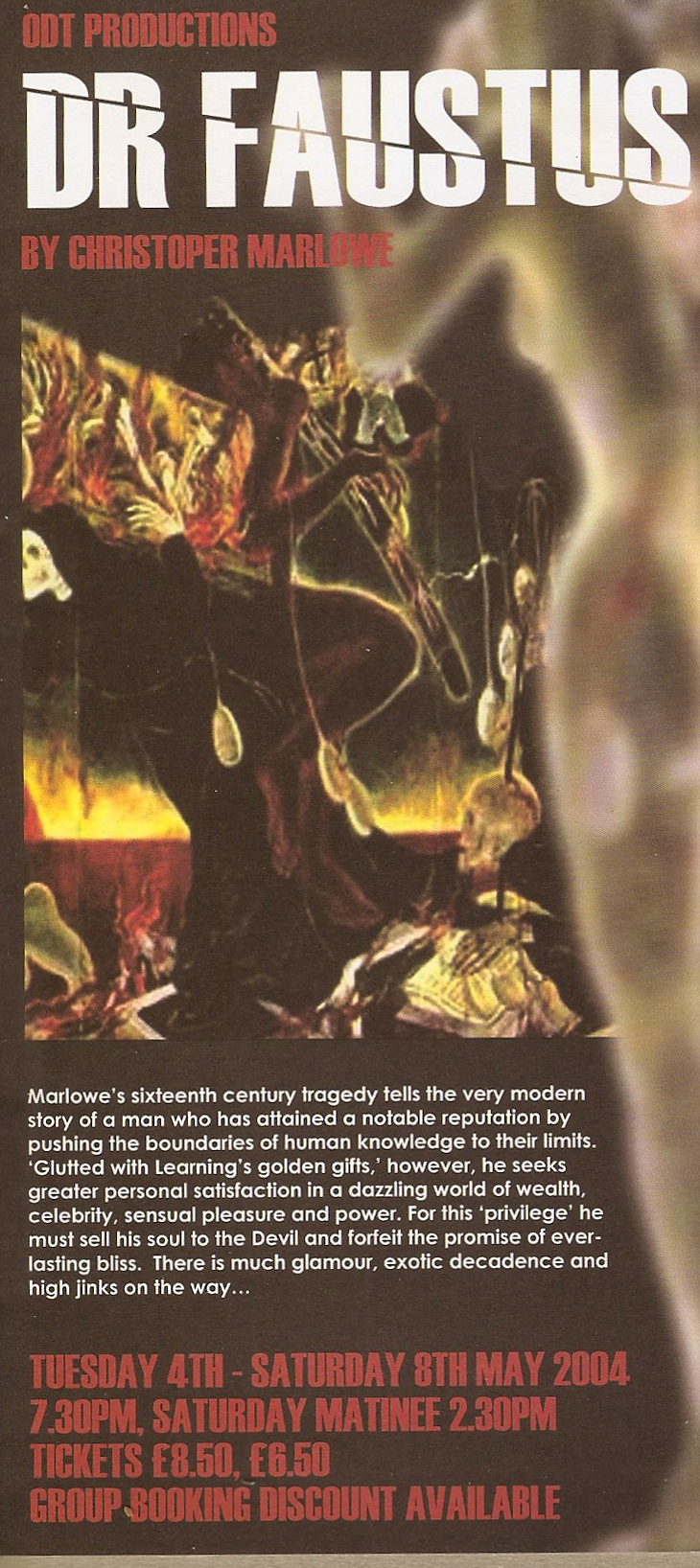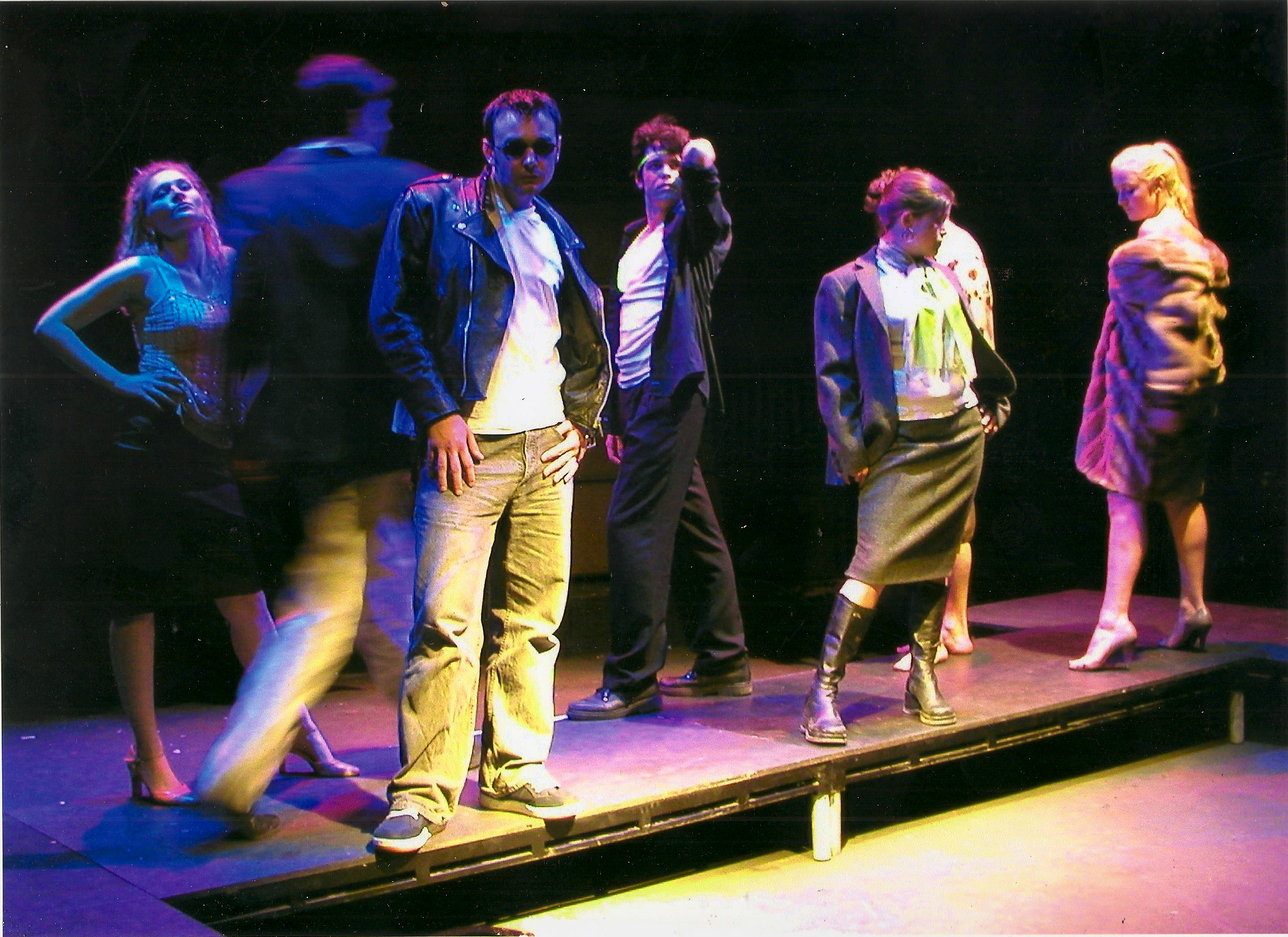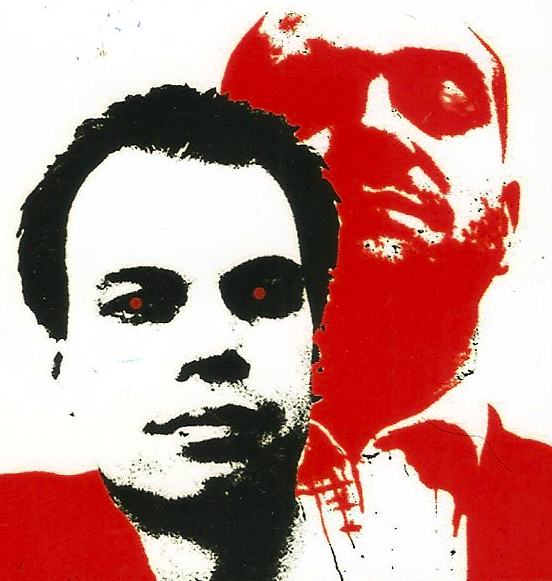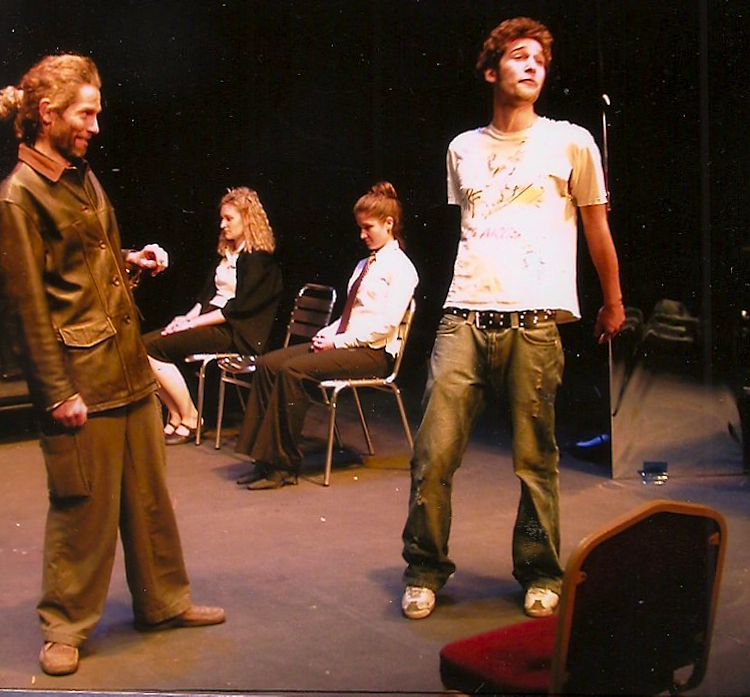
I decided to direct my own production of Dr Faustus at the Old Fire Station theatre in 2004. The play was on the A Level Theatre Studies syllabus, so I knew that we would be guaranteed an audience – always important! But reading the play again gave me ideas which were a joy to put into practice.
I was inspired by the rhythms of the first speech, in which Faustus reveals the extent of his knowledge, establishing one field, rejecting it and proceeding to another, very much in the manner of a Google search, to set the play in a high-tech, media-ridden present day, where the cult of Celebrity is a kind of religion. Faustus surfed the net to access his demons and satisfy his hunger for power, fame and sensual pleasure. Mephistopheles was a plausible computer salesman, luring Faustus to hell by promising untold pleasures if he would sign up for an updated software package. Visual and sound techniques were important throughout, the servants chatting to each other on their own laptops and Faustus’s meeting with the Emperor featuring as CNN News footage. This gave the play an immediacy, a reason for activity and relationship which had been sadly lacking in the 1996 production.
Faustus was played by Alex Nicholls, who had already acted Quince in A Midsummer Night’s Dream and Leontes in The Winter’s Tale, (together with parts in many other local productions), so I was confident that he had the necessary vocal range, versatility and physical dynamic for the role. As Alex said, ‘Faustus is a character of our age; Walter White springs to mind. However, unlike Walter, Faustus never really seems entirely willing to adopt his dark path. His tragic grandeur is diminished by the fact that he never quite comes to terms with his decision to trade his soul; he constantly struggles with whether or not he should repent … Great fun to play and hugely challenging.’

Mephistopheles was Joseph Adams, formerly a student of Radley College, where I had directed him as the Devil in a production of The Soldier’s Tale in 1989. Joseph had also played a charismatic M.C. in Cabaret at Radley, where, with no girls available, except for a female Sally Bowles, the chorus was a line of sixth form boys, all kicking high in their fishnet tights and obviously relishing the glamour!
I had not heard from Joe since he left Radley in the early ‘90s, so was quite taken aback when I got a call from him totally out of the blue in the autumn of 2003 asking if there was any theatre happening in Oxford. He auditioned for me and was immediately cast as Mephistopheles. There was no competition. I knew in advance that he would be perfect – no question. Joe had already played charming, seductive devils of the most alluring kind. In a recent email he speaks affectionately of his memories of the production, ‘As rehearsals progressed Alex transformed into a wild-eyed media savvy Faustus of the internet and televisual age, while I leered baldly in keen anticipation of taking his camera drenched soul.’ Both Joe and Alex received a generous review from Tutor at St Peter’s, Francis Warner, who commented that ‘the central relationship came over with uncanny clarity: Mephistopheles was the perfect foil for your Faustus, and gave an unforgettable performance.’
The production was well liked. Sixth-formers came from all over the UK, even from as far as ‘sunny Bolton’, and they and their teachers gave it high praise. The English teacher from Bolton said that ‘not all of my students came, but one of the boys attending said that I should have made it compulsory. High praise indeed from a 17-year old who has had to get up at 8.00am on a Saturday and travel in a bright yellow minibus, in the pouring rain, for over three hours to watch a 16th century play!’ University academics and literary critics were also positive. According to Francis Warner, ‘The use of visual electronics was a nice metaphor for modern magic and the whole concept was excellently thought through and delivered.’

Mephistophilis, (Joseph Adams).
By 2004 the stage available at the Old Fire Station theatre was just a relatively small, traditional ‘end-on’ space; actors could no longer perform in the round or in traverse, as we had done in our productions of Shakespeare and Brecht, for example. Sadly, these alternative types of staging now proved too costly, time-consuming and labour intensive to set up.
However this small ‘end-on’ space was just right for Faustus in his study and for the many other small scenes in the play. Then the filming to indicate different locations, together with use of laptops and mobiles certainly took the play onto a different level. Faustus’s meetings with the Emperor and Pope were shown on video; his travels with Mephistopheles were a slideshow presentation, including a snowy mountain scene (convincingly filmed in Edith Road Oxford on a fine winter’s day!) We were very lucky with our professional technicians: Gregg Browning - Visuals, and Tim Addy – Sound, who gave a lot of time and imaginative thought to the project, endowing the play with new life and relevance.

Clown (Jon Turner).
As Joe said, ’Somehow the play and filming gelled magically under Jackie’s superb direction and my lines slowly stuck, bit by bit.’ This is obviously a very flattering comment for me, but I would add that Joe had always been slow at learning lines, perhaps due to the infusion of cannabis(?) ‘When it came for us to strut our stuff in the OFS it was a vivid, powerful and gripping show that we happily performed, a show we were all sad to see come to an end after a successful run. Such halcyon days.’
Very different from the 1966 production, with its Devils’ cloaks and Helen’s ‘heaving bosom’!